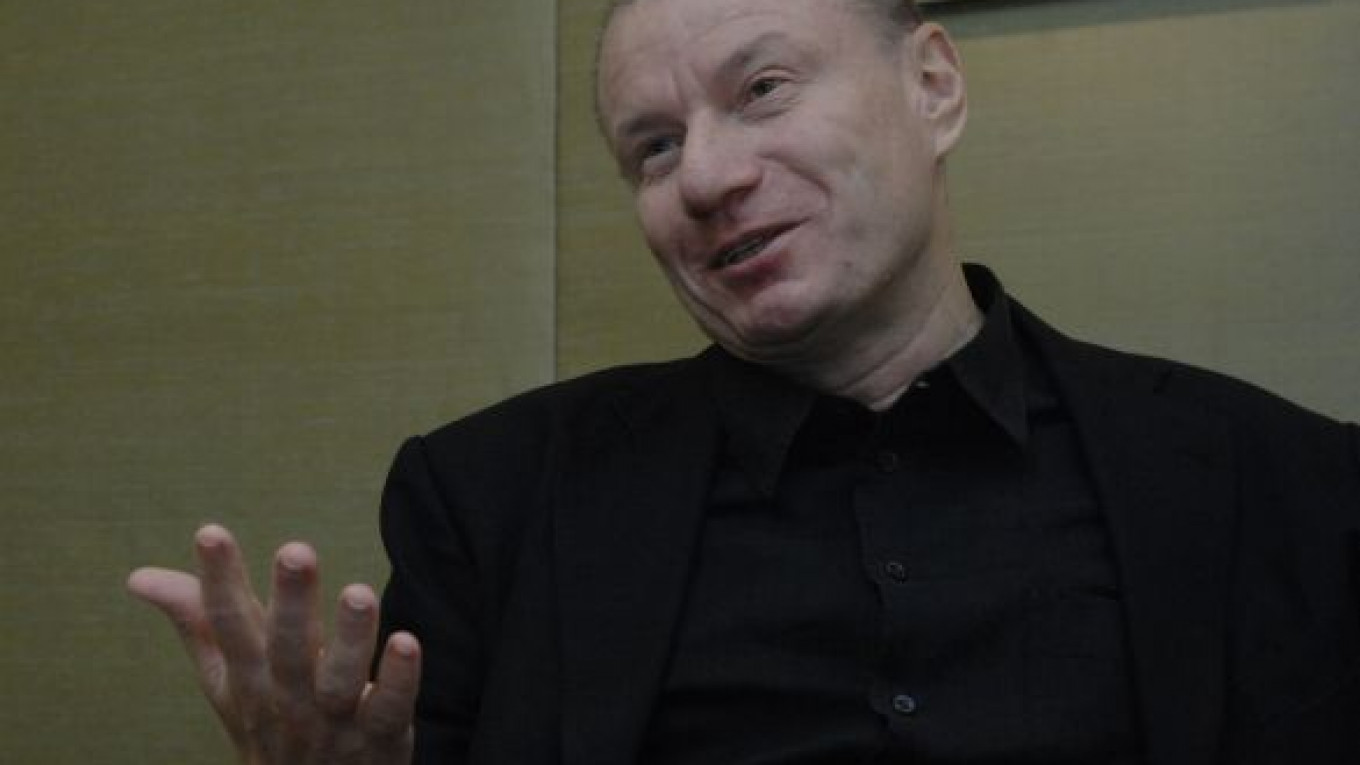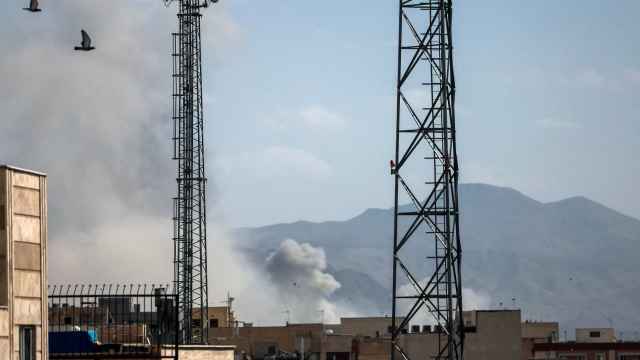LONDON — Gone are the beluga caviar parties and ostentation that marked the arrival of Russia's billionaire barons onto the world stage: The new cool for real oligarchs is a much more modest mingling among the common people.
At least that's how metals magnate Vladimir Potanin, with a fortune of $14.5 billion and ranked as Russia's fourth richest man, sees it.
When asked about the garish ways of some fellow businessmen, the 51-year-old tycoon said: "I am so cool and tough that I don't need guards."
"The really cool and tough people are not those who go everywhere with hundreds of bodyguards. The really cool and tough guys are the ones who go without their bodyguards," said Potanin, who owns a 30-percent stake in Norilsk Nickel, the world's largest nickel and palladium producer.
Potanin, who sat with the crowds in ordinary seats while attending four days of swimming, basketball, volleyball and handball at the Olympic Games, said lavish displays of wealth were insulting and distasteful.
"It is not good to demonstrate your luxury and your wealth; to rub it in the faces of others is insulting," he told Reuters in an interview. "So you should be modest, try not to insult people by showing that you can do what they cannot."
Though he quipped that he drew the line at using London's public transportation system, Potanin's decision to dispense with the VIP boxes indicates that at least some of Russia's billionaires may be starting to take on the more understated code favored by the established wealthy in Europe, North America and Asia.
Driven in part by a need to appease President Vladimir Putin's distaste for public displays of oligarch opulence, the modesty marks a new stage in the roller-coaster history of Russia's most powerful post-Soviet tycoons.
Potanin's privileged upbringing as the son of a high-ranking Soviet trade official and an education at Moscow's elite diplomatic academy have always set him apart from some of the more showy tycoons, many of whom started off trading theater tickets, Lada cars and fake Levi's jeans on the streets.
"It is not so much that I am a blue-blooded oligarch: I just don't feel like an oligarch," Potanin said in the hour-long interview at one of London's most exclusive hotels, where double rooms costs £400 ($630) a night.
"I am here not as an oligarch, I am here as an ordinary, regular spectator and I sit in the normal seats with the crowd. I have the same tickets as you do, and I follow the same procedure as you," he said.
Building fortunes as the Soviet Union crumbled, a small group of tycoons known as the oligarchs convinced the Kremlin under late President Boris Yeltsin to give them control over some of the biggest oil and metals companies in the world.
The privatization deals gave Potanin and other tycoons the national champions of a former superpower, propelling them into the league of the world's super rich and earning them the enduring dislike of millions of impoverished Russians.
But if the 1990s were the time of often dangerous takeover battles in the wilds of Siberia, the 2000s were when Russia's billionaires signaled to the world that they had returned as high-rollers almost a century after Russian aristocrats had dazzled Europe with gambling and sumptuous displays of wealth.
Roman Abramovich, whose fortune is estimated at $12.2 billion, purchased Chelsea Football Club in west London in 2003, showing the Russians had arrived. More followed.
With splendid fortunes and pasts as mysterious as F. Scott Fitzgerald's Great Gatsby, Russians became the stuff of legend and ridicule as the biggest spenders in cities such as London, where the trend prompted the terms "Londongrad" or "Moskva-on-Thames."
The extravagance of Russia's rich abroad even became a source of pride among some Muscovites: Russia may have lost an empire, but at least its richest could still outspend the best of the West.
The mastermind behind the loans-for-shares auctions of the 1990s said that ostentatious displays of wealth were insulting for millions of Russians who missed out on the privatizations.
"Many people say the privatization was unfair. That is true — it was unfair. That is a fact: Some people became rich and others did not. Unfair does not mean illegal, but it was inevitably unfair," Potanin said.
"I am not trying to say that I am poor and that I don't like beautiful things. But I don't like luxury for luxury's sake, or in the sense of showing off luxury," said Potanin, who owns a 75-meter yacht.
Potanin is not alone.
While the oligarchs still live in adrenaline bubbles of splendor that would test the nerves of most mortals, the richest are trying — at least in public — to portray a more conservative face to the world.
Vladimir Lisin, Russia's second-richest man with a $15.9 billion fortune, is an avid hunter who prefers Cuban cigars and clay pigeons to showing off in public.
Other Russian billionaires take extreme driving holidays rather than bathing on the decks of lavish yachts.
Even Mikhail Prokhorov, the whiz-kid of Russian finance and Potanin's partner for 15 years, has reinvented himself as a politician with an "obsession" about the country's future and a plan to put it on the right track.
Prokhorov, ranked as Russia's seventh-richest man and its most eligible bachelor, was detained briefly in a French ski resort in a prostitution probe in 2007. He was released without charge.
Russia's 96 billionaires control fortunes worth a total of $376.1 billion, or a little under one fifth of Russia's $2.0 trillion economy, while China, whose $7.8 trillion economy is more than three times as big as Russia's, has 95 billionaires.
Potanin, one of the biggest investors behind the Sochi 2014 Winter Olympics, with a $2.5 billion commitment, said the biggest surprises of the London Olympics had been the strength of the Chinese team, which so far has the most gold medals.
"We all knew they had been preparing themselves for swimming because there was a lack of medals for China in swimming. But I, frankly speaking, never thought they could be so successful," said Potanin.
When asked whether the strength of China at the Olympics merely fitted a wider growth of Chinese economic and political power, Potanin said: "Yes, that is true. But each time when we see it, it is surprising."
The world's 46th richest man, who said he did about 10 hours of exercise a week including jogging, stretching and Chinese Qigong exercises, said he hoped Russia would be among the top three medal winners at the Sochi Winter Olympics.
"We will not be number one: Our aim is to be among the top three, that is realistic," he said.
"We used to have a powerful machine in sport, then there was nothing for 10 years. Now we are re-launching this machine, but when a powerful machine stops, it is very difficult to make it run again."
A Message from The Moscow Times:
Dear readers,
We are facing unprecedented challenges. Russia's Prosecutor General's Office has designated The Moscow Times as an "undesirable" organization, criminalizing our work and putting our staff at risk of prosecution. This follows our earlier unjust labeling as a "foreign agent."
These actions are direct attempts to silence independent journalism in Russia. The authorities claim our work "discredits the decisions of the Russian leadership." We see things differently: we strive to provide accurate, unbiased reporting on Russia.
We, the journalists of The Moscow Times, refuse to be silenced. But to continue our work, we need your help.
Your support, no matter how small, makes a world of difference. If you can, please support us monthly starting from just $2. It's quick to set up, and every contribution makes a significant impact.
By supporting The Moscow Times, you're defending open, independent journalism in the face of repression. Thank you for standing with us.
Remind me later.






